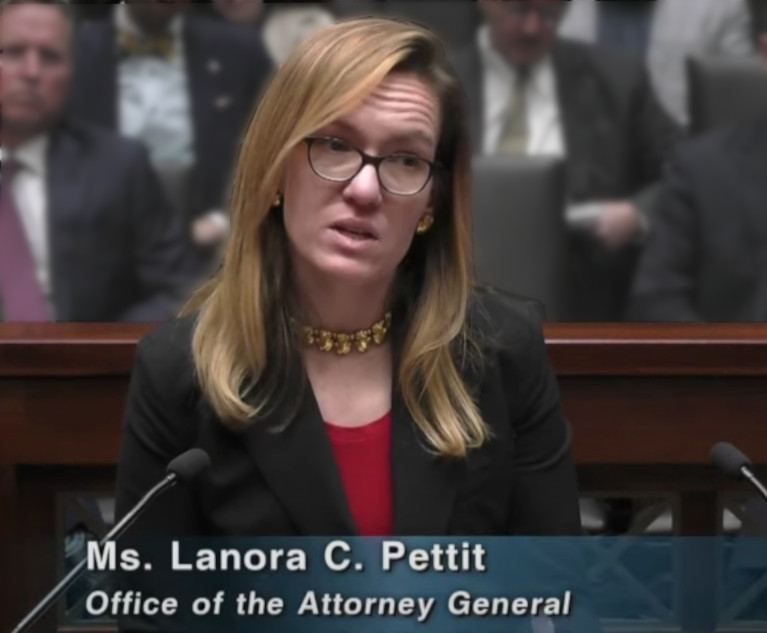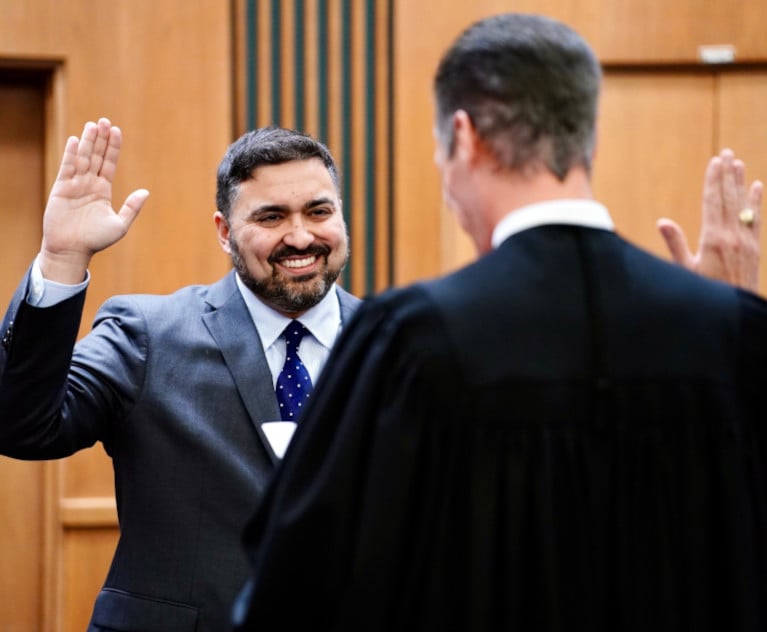Judge Temporarily Blocks Ordinance That Would Require Paid Sick Leave in Dallas
The U.S. District Court for the Eastern District of Texas in Sherman adopted reasoning by Austin's Third Court of Appeals, which previously held that state law—the Texas Minimum Wage Act—preempts cities from enacting sick leave ordinances.
March 31, 2020 at 05:44 PM
3 minute read
 Photo: Andrey_Popov/Shutterstock.com
Photo: Andrey_Popov/Shutterstock.com
Dallas has joined both Austin and San Antonio in having its paid sick leave ordinance temporarily blocked amid legal challenges claiming the laws violate constitutional rights.
In a case that labor and employment lawyers have been tracking closely, a Dallas-Fort Worth-area law firm, staffing agency and the state of Texas challenged the legality of the Dallas ordinance, which would have given 64 hours of sick leave to people at large employers, and 48 hours of leave to people at small employers.
In Texas, employers are not mandated to provide paid sick leave, although many companies voluntarily do so as a benefit. But Dallas, Austin and San Antonio metros passed their ordinances requiring paid sick leave around the same time. All face legal challenges.
The argument is that the state Legislature had already set the minimum wage in Texas, and mandating additional paid sick leave is essentially raising the minimum wage. Because the Texas Constitution prohibits a city from passing ordinances that conflict with state law, the plaintiffs argue the city sick leave laws are unconstitutional.
The U.S. District Court for the Eastern District of Texas in Sherman adopted reasoning by Austin's Third Court of Appeals, which previously held that state law—the Texas Minimum Wage Act—preempts cities from enacting sick leave ordinances. Judge Sean Jordan acknowledged that his ruling came during a time when the nation was dealing with crisis and upheaval from the coronavirus, and Congress has granted 80 hours of paid sick leave to people who become infected. But in the present case, state law guides what Texas cities can do, he wrote.
"The court's decision to grant a preliminary injunction upholds the state constitution and statutory provisions preempting and rendering unenforceable the city's paid sick leave ordinance," Jordan wrote, noting that the Texas Supreme Court has a pending case over Austin's sick leave ordinance to decide the preemption issue for good.
Read the opinion:
Dallas representative Deme Jackson declined to comment.
Plaintiffs attorney Robert Henneke, general counsel for the Texas Public Policy Foundation, said Jordan's ruling is consistent with the outcome of the Austin and San Antonio sick leave cases. Henneke is also involved in those cases.
"It is unconstitutional for cities to regulate and mandate wages," said Henneke. "Part of the story is that this is yet one more court that has reached the same outcome."
The Dallas case is proceeding in federal court instead of state court, since the plaintiffs are headquartered in Collin County, but had employees in Dallas who would be subject to the sick leave ordinance.
Hagan Law Group, a management-side employment firm headquartered in the Collin County town of Allen, claimed in the lawsuit that the ordinance would make the firm buy new time-tracking software and incur other implementation costs, as well as pay the money for employees' sick leave.
The firm, and another plaintiff, Plano-based staffing agency ESI/Employee Solutions, allege in ESI/Employee Solutions v. City of Dallas that the new sick leave ordinance violates the U.S. and state constitutions and clashes with a state minimum wage law. The state of Texas joined the lawsuit later.
Related story:
Texas Attorney General Joins Law Firm's Constitutional Challenge to Dallas Sick Leave Ordinance
This content has been archived. It is available through our partners, LexisNexis® and Bloomberg Law.
To view this content, please continue to their sites.
Not a Lexis Subscriber?
Subscribe Now
Not a Bloomberg Law Subscriber?
Subscribe Now
NOT FOR REPRINT
© 2025 ALM Global, LLC, All Rights Reserved. Request academic re-use from www.copyright.com. All other uses, submit a request to [email protected]. For more information visit Asset & Logo Licensing.
You Might Like
View All


Trending Stories
- 1German Court Orders X to Release Data Amid Election Interference Concerns
- 2Litigation Trends to Watch From Law.com Radar: Suits Strike at DEI Policies, 'Meme Coins' and Infractions in Cannabis Labeling
- 3Judge Gets Public Reprimand for Favoring Cops
- 4Investor Sues in New York to Block $175M Bitcoin Merger
- 5Landlord Must Pay Prevailing Tenants' $21K Attorney Fees in Commercial Lease Dispute, Appellate Court Rules
Who Got The Work
J. Brugh Lower of Gibbons has entered an appearance for industrial equipment supplier Devco Corporation in a pending trademark infringement lawsuit. The suit, accusing the defendant of selling knock-off Graco products, was filed Dec. 18 in New Jersey District Court by Rivkin Radler on behalf of Graco Inc. and Graco Minnesota. The case, assigned to U.S. District Judge Zahid N. Quraishi, is 3:24-cv-11294, Graco Inc. et al v. Devco Corporation.
Who Got The Work
Rebecca Maller-Stein and Kent A. Yalowitz of Arnold & Porter Kaye Scholer have entered their appearances for Hanaco Venture Capital and its executives, Lior Prosor and David Frankel, in a pending securities lawsuit. The action, filed on Dec. 24 in New York Southern District Court by Zell, Aron & Co. on behalf of Goldeneye Advisors, accuses the defendants of negligently and fraudulently managing the plaintiff's $1 million investment. The case, assigned to U.S. District Judge Vernon S. Broderick, is 1:24-cv-09918, Goldeneye Advisors, LLC v. Hanaco Venture Capital, Ltd. et al.
Who Got The Work
Attorneys from A&O Shearman has stepped in as defense counsel for Toronto-Dominion Bank and other defendants in a pending securities class action. The suit, filed Dec. 11 in New York Southern District Court by Bleichmar Fonti & Auld, accuses the defendants of concealing the bank's 'pervasive' deficiencies in regards to its compliance with the Bank Secrecy Act and the quality of its anti-money laundering controls. The case, assigned to U.S. District Judge Arun Subramanian, is 1:24-cv-09445, Gonzalez v. The Toronto-Dominion Bank et al.
Who Got The Work
Crown Castle International, a Pennsylvania company providing shared communications infrastructure, has turned to Luke D. Wolf of Gordon Rees Scully Mansukhani to fend off a pending breach-of-contract lawsuit. The court action, filed Nov. 25 in Michigan Eastern District Court by Hooper Hathaway PC on behalf of The Town Residences LLC, accuses Crown Castle of failing to transfer approximately $30,000 in utility payments from T-Mobile in breach of a roof-top lease and assignment agreement. The case, assigned to U.S. District Judge Susan K. Declercq, is 2:24-cv-13131, The Town Residences LLC v. T-Mobile US, Inc. et al.
Who Got The Work
Wilfred P. Coronato and Daniel M. Schwartz of McCarter & English have stepped in as defense counsel to Electrolux Home Products Inc. in a pending product liability lawsuit. The court action, filed Nov. 26 in New York Eastern District Court by Poulos Lopiccolo PC and Nagel Rice LLP on behalf of David Stern, alleges that the defendant's refrigerators’ drawers and shelving repeatedly break and fall apart within months after purchase. The case, assigned to U.S. District Judge Joan M. Azrack, is 2:24-cv-08204, Stern v. Electrolux Home Products, Inc.
Featured Firms
Law Offices of Gary Martin Hays & Associates, P.C.
(470) 294-1674
Law Offices of Mark E. Salomone
(857) 444-6468
Smith & Hassler
(713) 739-1250







